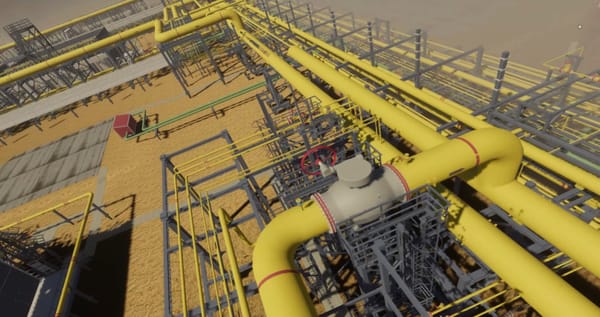The Future of Events: How Technology Will Disrupt the Industry Faster Than You Think
This week, I had the chance to participate in a roundtable discussion with 30 tech-savvy professionals at an event in Manchester. The conversation? The rapidly evolving landscape of the events industry, and how technology is about to shake things up faster than we could have imagined.

This week, I had the chance to participate in a roundtable discussion with 30 tech-savvy professionals at an event in Manchester. The conversation? The rapidly evolving landscape of the events industry, and how technology is about to shake things up faster than we could have imagined.
The message is clear: evolve with the times, or watch as new players take the stage.
As we all swapped insights on the future, one thing became crystal clear: traditional in-person events are no longer the golden standard they once were. If the events industry doesn’t adapt, it’s at risk of being left behind. Here’s what we discussed, and why the future is digital.
1. The In-Person Event Obsession: Time to Let Go?
For years, in-person events have dominated the industry. There’s something about face-to-face interaction that has kept companies clinging to the traditional conference and trade show model. But let’s face it, the cost of hosting or attending in-person events can be astronomical. Think about the flights, hotel rooms, venue rentals, and the countless hours spent away from work. It’s not just hard on your wallet; it's hard on your schedule and the planet.
The environmental impact of large-scale travel for events is no small issue either. As companies strive for more sustainable practices, the carbon footprint of flying thousands of attendees across the globe to one city starts to feel irresponsible. With the tech that exists today, why are we still flying across continents when the alternative could be just as (or even more) engaging?
2. Smaller Events in a Virtual World: Why VR Is the Answer
One of the most exciting ideas we discussed was the potential of hosting smaller, more niche events inside virtual reality (VR). Imagine attending a product launch, a roundtable, or a networking event without ever leaving your home. Sounds too good to be true, right? But we’re already there.
With VR headsets, event planners can create fully immersive environments where participants can interact, engage, and collaborate in ways that are arguably more effective than the traditional in-person format. We’re not just talking about popping into a Zoom call. Picture virtual auditoriums, customizable meeting rooms, and even virtual expo halls filled with digital billboards that feature targeted ads based on your interests.
Advertising in VR is a game-changer. Companies can create dynamic digital billboards that adjust in real-time, offering brands more bang for their buck. And for attendees, it’s a more seamless, engaging experience that actually captures your attention—unlike a flyer you might grab in the hallway at a conference.
3. Bringing Large Events to the Masses with VR Live-Streaming
Now, let’s talk about the big conferences—the ones that pull in tens of thousands of attendees. They might seem untouchable by digital disruption, but even these mega-events could benefit from technology, especially with live-streaming through VR.
While in-person conferences won’t disappear completely, VR allows events to scale like never before. You could have a few thousand in-person attendees, but millions more tuning in from around the world via VR headsets. What’s even better? VR can offer an interactive experience that live-streams alone can’t provide. You’re not just watching a speaker from a screen; you’re immersed in the same room, feeling the energy of the crowd, all while getting an up-close view from the best “seat” in the house.
This opens the door for companies to expand their reach, offering hybrid events that combine the intimacy of in-person gatherings with the scale and accessibility of VR live-streaming. You no longer have to worry about "sold-out" tickets—everyone can join.
4. Onboarding Attendees with Immersive Ticketing
One of the most overlooked parts of the event experience is the ticketing process. It’s often transactional and cold—buy your ticket, get a confirmation email, show up on the day. But with new tech, even this can be transformed into something far more immersive.
Imagine this: from the moment you purchase a ticket, you're instantly transported into a virtual lobby that gives you a preview of the event. You can explore virtual booths, connect with other attendees, and even try out demos from sponsors—weeks before the event kicks off. This isn't just about onboarding attendees better, it's about making the entire journey, from ticket purchase to post-event follow-up, feel cohesive and exciting.
Attendees will feel the buzz of the event long before the day arrives, building anticipation and driving deeper engagement. It’s the future of ticketing, and it’s closer than we think.
The Clock Is Ticking: Adapt or Get Left Behind
So, what does all this mean for the future of the events industry? Simply put, major disruption is coming, and it’s coming fast. Companies need to start embracing technology now or risk being overtaken by more forward-thinking competitors.
The old model of relying solely on in-person events is unsustainable. The next generation of event-goers—who are more comfortable in digital spaces—won’t be impressed with a lackluster in-person experience when they could have an interactive, fully immersive one from anywhere in the world.
The industry is ripe for innovation, and the businesses that adapt to these emerging technologies will be the ones that lead the charge into the future. Those that don’t? Well, they’ll likely be left behind, consumed by new, more modern companies who aren’t afraid to embrace the change.
F.A.Qs
Why should the events industry move away from in-person events?
The traditional in-person model, while still valuable, comes with high costs, logistical challenges, and a significant environmental impact due to travel. Virtual and hybrid events offer cost-effective, sustainable, and scalable alternatives. Attendees can participate from anywhere, cutting down on travel time and expenses, while companies benefit from wider reach and lower overheads.
How can VR improve engagement at smaller events?
VR can create immersive, interactive environments for smaller events that go beyond the limitations of physical spaces. Attendees can experience customized 3D environments, interact with digital objects, engage in networking sessions, and view virtual advertising billboards—all from the comfort of their homes. VR keeps participants engaged in ways that traditional events struggle to match.
How can live-streaming in VR benefit large-scale events
Live-streaming in VR enables large events to scale beyond physical venue limitations, offering an immersive experience to global audiences. Millions of people can tune into conferences, keynotes, or trade shows in real-time through VR headsets, creating a sense of being "in the room" without being physically present. It enhances the reach of events and offers attendees a more interactive experience.
What is immersive ticketing, and how does it enhance the event experience?
Immersive ticketing transforms the process of buying a ticket into an engaging journey. After purchasing a ticket, attendees can be taken into a virtual lobby or preview of the event, allowing them to explore booths, demos, or network with other participants well before the actual event. This helps build anticipation and creates a more cohesive, engaging experience from the moment of purchase.
What happens to companies that don’t adapt to new event technologies?
Companies that fail to embrace new technologies, like VR, live-streaming, and immersive ticketing, risk being overtaken by more innovative competitors. As more people become comfortable with digital and hybrid experiences, traditional event models will feel outdated and less engaging. Businesses that are slow to adapt may lose relevance in an increasingly tech-driven world.
Conclusion
The events industry is at a pivotal point. From VR-hosted gatherings and virtual advertising billboards to live-streaming large conferences and creating immersive ticketing experiences, the potential for technology to revolutionise events is undeniable. Companies that seize this opportunity will find themselves at the forefront of an industry that’s more efficient, engaging, and accessible than ever before.
The message is clear: evolve with the times, or watch as new players take the stage.






